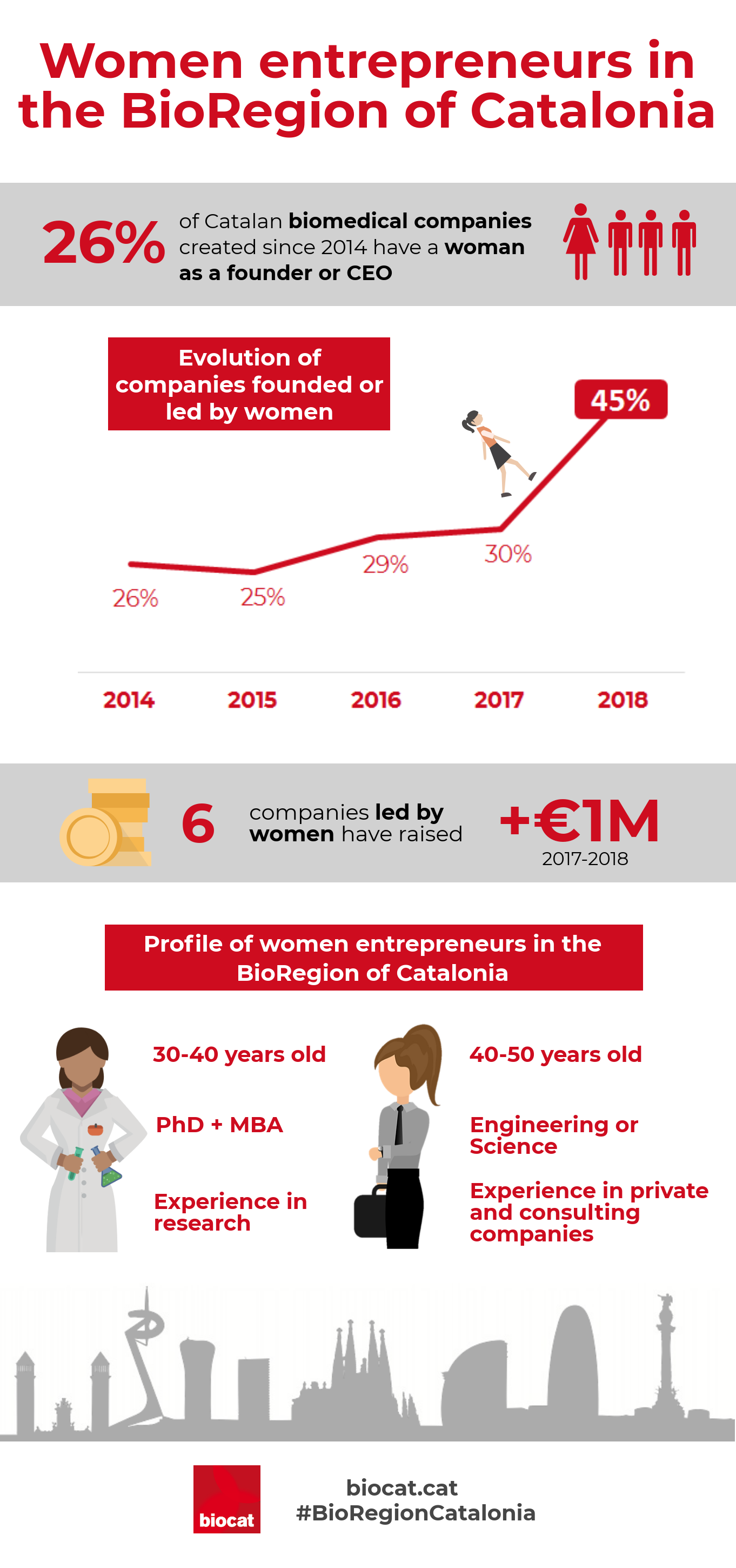“If they could do it, so can you!”
<p>One in four companies created in the BioRegion of Catalonia in the past five years is led by a woman. This percentage is growing, but still far from parity. Women call for greater public visibility so that other female researchers can see them as role models and choose to follow in their footsteps.</p>

“Your project is really good, but you should step aside and let one of the laboratory heads or a professor at an important institution lead it.” This is the advice an expert in the sector gave scientist Laura Soucek, co-founder and CEO of Peptomyc, a few years back. That man couldn’t imagine that Laura not only had a brilliant project (an innovative cancer therapy) but was also a laboratory head and an ICREA professor. Meaning she was the perfect person to lead the company.
In fact, Laura Soucek, along with co-founder and CEO of Iproteos Teresa Tarragó, is on the list of Top 10 young female entrepreneurs in biotechnology published this month in the European journal Labiotech. These two women, both from the BioRegion of Catalonia, are the only Spaniards on the ranking.
And that’s no coincidence. 26% of Catalan biomedical companies created over the past five years have a female CEO or founder, according to Biocat data. For companies created in 2018, the figure is 45%, suggesting an upward trend in female scientists who decide to go down the path of entrepreneurship.
The biomedical companies created by women last year in Catalonia include ADmit Therapeutics a spin-off of IDIBELL that is developing a test for early diagnosis of Alzheimer. The company is the result of a clinical project led by Dr. Marta Barrachina over the past three years, with support from a team of neurologists. “Dr. Ramon Reñe and Dr. Jordi Gascon are the other two founders and no discussion was necessary to decide that I would be the CEO,” Barrachina told us a few months ago in an interview.
For years now, pioneers like Carmen Plasencia (co-founder and CEO of Aromics) and Ana Maiques (co-founder and CEO of Neuroelectrics and named one of the most innovative women of 2014 by the European Union) have been blazing the trail, and now female faces are more and more common in the sector, even in the more technology-heavy subsectors. In fact, the companies in the BioRegion of Catalonia with the most women on the founding or executive team are working in medical technology (32%) followed by biotechnology companies (27%).
This month was the International Day of Women and Girls in Science, and the need to encourage vocation among young girls has been discussed a lot. The reality, however, is that of the nearly 19 million scientists and engineers in the European Union, 41% are women, and in Spain this percentage is 48%.
So why don’t more female researchers take the plunge and go into entrepreneurship? A few months ago, I put this question to 11 female entrepreneurs in the sector and many agreed on the diagnosis: lack of role models, female CEOs with public visibility who other researchers can follow. “We have to create the If she could do it, so can I effect,” summed up Judit Anido, co-founder and general manager of Mosaic Biomedicals.
They have done it, and well. Of the 33 Catalan biomedical companeis to raise over €1 million in investment in 2017 and 2018, 18% (6 companies) are led by women.
Peptomyc was one of them. “Female scientists are used to defying a sexist world,” Laura Soucek told us in an interview. Being a woman hasn’t been an obstacle for me, but it has forced me to answer questions no one would ever have asked a man.” She isn’t the only one that feels this way. “A woman’s ability to manage the company is questioned more openly,” explained Judit Cubedo, co-founder and CEO of GlyCardial, another of the companies that have raised more than €1 million over the past two years. DyCare also closed an important round in 2017. A few months later, the company’s founder and CEO, Silvia Raga, got pregnant. “The investors’ support was unconditional,” she says.
In fact, Silvia Frutos, co-founder and COO of ProteoDesign, believes, “Some investors are more comfortable with a company led by a woman: they see us as more sensible and responsible.” Some studies back this up: associating gender and results is controversial, but even McKinsey dared to say that companies with more female executives post results that are 27% better than the sector average.
Another company co-led by a woman that has raised more than €1 million over the past two years is Social Diabetes. Co-founder Maria Jesús Salido says she has come across obstacles in the ‘day-to-day’ because she is a woman. “It is more difficult to generate confidence among investors; I walk into a negotiation and often am not considered a valid participant; I have to put up with paternalistic advice from men...”
The same type of advice Laura Soucek got, as we mentioned at the beginning of this post. Luckily, Laura didn’t listen to this advice and today many female researchers have her and the rest of the women in today’s post as role models: “If they could do it, why can’t I!”



